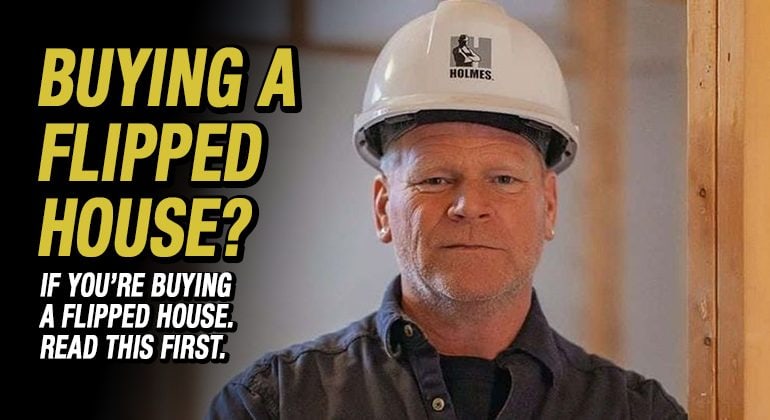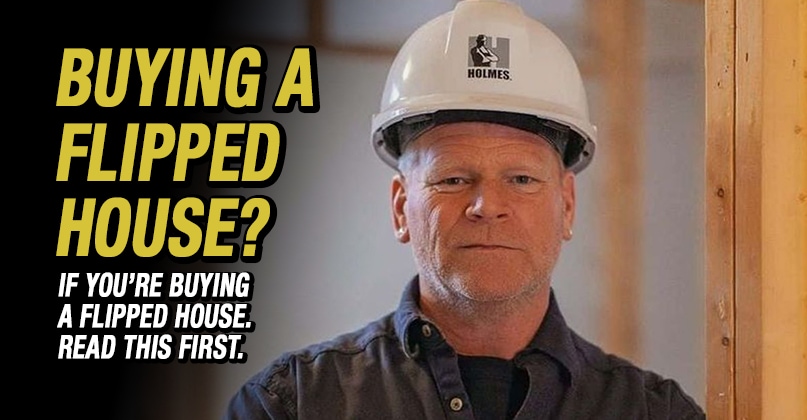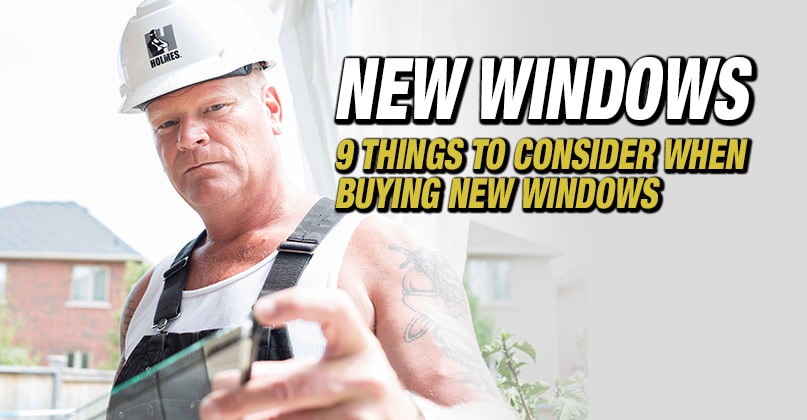I love exploring new technology—especially when it genuinely improves how we work in construction—and I recently came across one that truly impressed me, iGUIDE by Planitar Inc. In my...

Are You Buying A Flipped House? Read This First.
By Mike Holmes
Mike’s Advice / Buying & Selling Your Home
Wednesday, October 20th, 2021 @ 4:58pm
Buying A Flipped House
First of all, I hate the word “flip.” You want to RENOVATE IT RIGHT and then SELL IT RIGHT and document what you’ve done. A flipped house means a house that has been renovated to sell. In my experience, the workmanship is less than desirable.
When you’re buying a home, you’ve got a lot of questions to ask yourself. Among them, do you want a new build home, an older, fixer-upper, or somewhere in the middle? By that, I mean a home that’s showing its age in a few places, but has generally been well taken care of by the previous owners.
In a Holmes Inspections episode, I helped a couple who purchased a property that had been renovated. Even though the surface looked good (cosmetic finishes, updated look), we could tell right away that the renovation work was performed improperly beneath the finishes. A house that looks good can still have major hidden defects — especially when it’s been flipped or renovated quickly. We essentially had to tear the house down.
Should You Buy A Flipped House?
The problem is, there’s a difference between a house that simply looks good and a home that was properly taken care of and upgraded. Often, house flippers who are attempting to make a quick profit on a sale will rely on their potential buyer not being able to tell distinguish between the two.
These flipped properties are especially a problem because they are deliberately made to look good but aren’t necessarily built or renovated right. They take advantage of homebuyers’ lack of knowledge when it comes to picking out shoddy workmanship.
If you’re walking through a home with your real estate agent that looks good on the surface, look out for these signs:
Spotting Questionable Renovations
It’s not out of the ordinary for a homeowner to make necessary upgrades to a home before they list. This can give the seller more power when it comes to the negotiation. A new roof, an upgraded furnace, or a new full set of windows is not only attractive to potential buyers, it gives them peace of mind that the home they’re buying has been properly maintained.

For owners who have been in the home for a long time, these upgrades likely happened slowly throughout the years.
READ NEXT:
The Recently Renovated Kitchen
If you’re walking through a home and the realtor boasts that both the kitchen AND the bathroom have been recently renovated, to me, that’s a huge red flag. Why? A renovation done right takes time, and it costs money.
Ask for more details about the renovations – specifically about the timeline. If these projects were completed in a few short weeks, I’d certainly want to take a much closer look at the quality of the work.
Search For Permits
If a home looks like it’s been renovated, do a search for any permits on work completed. If changes were made to the plumbing, electrical or structure, permits needed to be pulled.
As a potential buyer if you see a home with a lot of flashy upgrades that give you cause for concern, do a permit search on the property. You’ll be able to see if the homeowner got the proper permits needed for these renovations.
If the permits are there, it means the project was at least completed to code and signed off on by the city inspector. If no record exists, it’s an indication that the homeowner may have cut corners on their renovation in a rush to get it done and on the market.
READ NEXT:
Look Out For Sloppy Finishes
Other hints that can alert you to shoddy, quick work are cheap materials used through the renovation, poorly done trim, and sloppy paint jobs. If you notice only a few spots on the walls with fresh paint – it could even be a quick job to cover up instances of water damage.
When the trim is off or doesn’t line up you can bet the workmanship isn’t top quality. If they fumbled on the finishes, they probably cut corners on the stuff they know most buyers will not see — the stuff behind walls and below flooring.
READ NEXT:

See this post on Instagram
Look at the Sales History
How long has the current homeowner been in the house? If it’s less than a year, that could potentially be an indicator that the home was a flip – someone who tackled some lipstick and mascara renovations, without paying much attention to the structure of the home who hope to drive up the value of the property quickly.
Beware The Flashy Upgrades
Ask about the home’s renovation history. When was the roof last done? When was the furnace replaced? If these systems have been ignored and the homeowners instead opted for aesthetic upgrades you may find yourself ripping out those beautiful finishes sooner rather than later to run new ductwork, or have your wiring upgraded.
At the end of the day – you may wind up having to redo that kitchen a lot sooner to correct issues that were covered up.
Don’t Skip The Home Inspection
Don’t skip the home inspection, whether your home is brand new or 100 years old. The few hundred dollars you spend on the inspection is nothing compared to the total cost of the home – and it can alert you to any major deficiencies that your eyes can’t find.
The best way to protect yourself when buying a home is to arm yourself with as much knowledge about the property as you can. A qualified home inspector will help with that.
Knowing its sales history, the general state of its internal systems, as well as its past permits, will give you the ammunition you need to either make a good offer or know to walk away.

See this post on Instagram
READ NEXT:









